We will stream the keynote lectures via Zoom.
Link: https://tuni.zoom.us/s/67932290379
Meeting ID: 679 3229 0379
Rodney Harrison
Keynote presentation:
Reimagining heritage and museums for climate action
How can cultural institutions such as heritage sites, museums and galleries be reimagined to support radical forms of climate action? This talk draws on several recent international collaborative research projects which aim to address the role of heritage organisations in supporting action for climate and in realising more sustainable futures. These projects have been characterised by collaborative partnerships with heritage sector organisations and other actors which have sought to intervene not only critically, but also practically in the role of natural and cultural heritage preservation within the climate and extinction crises. They have done so by engaging organisations and publics as co-researchers in the research process and in aiming to rethink the conscious practical role of heritage in building distinctive future worlds.
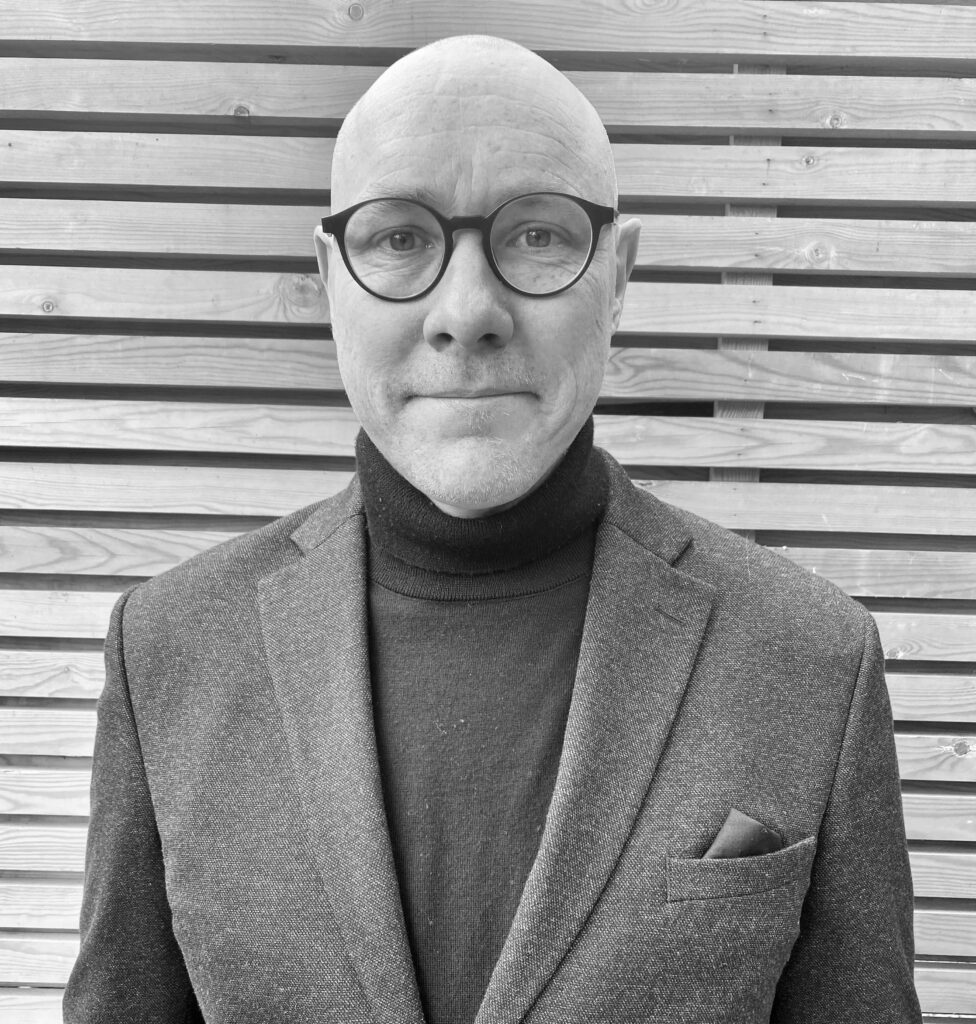
Rodney Harrison is Professor of Heritage Studies at the UCL Institute of Archaeology, where he is Co-Director of the Joint UCL/University of Gothenburg Centre for Critical Heritage Studies (CCHS). From 2017-2021 he was AHRC Heritage Priority Area Leadership Fellow, from 2015-2019 he was Principal Investigator on the AHRC-funded Heritage Futures research programme, and from 2016-2021 he led the Work Package on “Theorizing heritage futures in Europe: heritage scenarios” as part of the European Commission funded Marie Sklodowska-Curie action [MSCA] Doctoral Training Network CHEurope: Critical Heritage Studies and the Future of Europe. He is (co)author or (co)editor of around 20 books and guest edited journal volumes and almost 100 peer reviewed journal articles and book chapters. Some of these have been translated into Chinese, Italian, Polish and Portuguese language versions. In addition to the AHRC his research has been funded by the UKRI/Global Challenges Research Fund, British Academy, Wenner-Gren Foundation, Australian Research Council, Australian Institute of Aboriginal and Torres Strait Islander Studies and the European Commission. He has conducted archaeological, anthropological and/or archival research in Australia, Southeast Asia, North America, South America, the Middle East, UK and continental Europe. His most recent books, all co-authored/edited and available in open access, include Heritage Futures: Comparative Approaches to Natural and Cultural Heritage Practices (UCL Press, 2020), Deterritorializing the Future: Heritage in, of and after the Anthropocene (Open Humanities Press, 2020) and Reimagining Museums for Climate Action (Museums for Climate Action, 2021).
Ute Lehrer
High-rise buildings have long been a significant form in urban development. But this vertical form of living comes with its own challenges and the COVID-19 pandemic of the last two years has magnified some of the problems for life in close proximity. The high-rise is not just as a built form but also a place where unique configurations of shared spaces and spatial practices exist. While a large body of work has emerged that seeks to understand the implications of verticality for urban living, very little has been said about the role of shared amenity spaces. In this talk, I will focus on the role of common spaces in high-rise buildings. How might these common areas destabilize or transgress the vertical form? Conceptually, following Henri Lefebvre’s fertile theorization of the social production of space that involves conceived, perceived and lived spaces, I will argue that shared spaces, as a multidimensional phenomenon, have the potential to become public space. The role of public space in high-rise apartments will be deliberated by using examples from two different time periods: from the 1950 to the 1980s and from the 2000 to today, research work that I did in collaboration with Loren March. We observe revisitations of past imaginaries and built forms in high-rise development, whose emergent hybrid and contradictory forms of public space now pose new possibilities for everyday life and spatial practice in these buildings. Within verticality’s built and social environments, there is great potential for the fostering of transformative capacity around what John Friedmann describes as the “Good society”. If social sustainability in urban design is understood as infrastructure supporting social and cultural life, then these common spaces are sites of precisely that: creating opportunities for social sustainability.
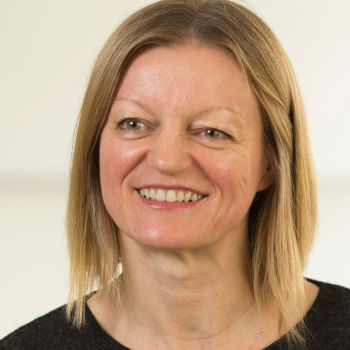
Ute Lehrer is a Full Professor at the Faculty of Environmental and Urban Change, York University (Toronto, Canada). She holds degrees from University of Zurich, Switzerland, and University of California, Los Angeles in urban planning, art and architectural history, sociology and economic and social history. Ute Lehrer has previously taught at Brock University and SUNY Buffalo, was a researcher at the Swiss Federal University of Technology in Zurich, and held visiting positions at Université de Montpellier, France, University of the Witwatersrand, Johannesburg, and University of Manchester, UK. She was the recipient of several awards, including UCLA’s Chancellor Fellowship, UC Berkeley’s Research Fellowship and the American Institute for Certified Planners. She was the Vice-President North America of the Research Committee 21, ISA, and an Editorial Board Member of the International Journal for Urban and Regional Research.
Taking a critical and comparative approach, her research interests include urban design and land use; housing, gentrification and the condominium boom; discourse and mega-projects; as well as the social construction of public space. She has published widely in social science journals and edited books. She was the Principal Investigator and a collaborator in several Social Sciences and Humanities Research Council (SSHRC)-funded research projects, including on Global Suburbanisms.
Vishanthie Sewpaul
Keynote presentation:
Restructuring the post-apartheid city: The case of the city of Durban in the eThekwini Municipality of South Africa
SDG 11 that addresses the need for inclusive, safe, resilient and sustainable cities, cannot be seen in isolation from the other SDGs. Human development, happiness, peace and freedom from suffering depend on, inter-alia: access to basic resources; building social trust and cohesive societies; transparent, honest and democratic governments; distributive justice; empowerment of people; non-discrimination in all forms; peaceful co-existence among people and between people and the environment; and civic participation. In this presentation, I focus on Durban, a city which is the heartbeat of the eThekwini Municipality in South Africa. Durban has one of the busiest ports in the Southern hemisphere, and is a major centre of tourism, trade and manufacturing. The city boasts high levels of biodiversity, which unfortunately is highly threatened, and it is not spared from the effects of global warming and climate change. As with the rest of South Africa, Durban’s colonial and apartheid past has significant impacts on its development trajectory. Cities serve to localize the SDGs, and attempts have been made to restructure Durban to this end. Durban – a city of enormous contrasts – is characterized by marked spatial marginalization of poor communities with inadequate transportation to and from their places of work; rapid urban growth and the mushrooming of informal, shack dwellings; homelessness; compromised safety of public spaces; high levels of unemployment; and an informal economy, where for many non-motorised transport is hazardous. In addition to historical influences, the country’s post-apartheid neoliberal choices have deepened environmental degradation, inequality, crime and corruption, which pose huge threats to sustainability and the city’s and the country’s fragile democracy and race relations. Against this background, I focus on the inter-relationship between planetary and social imbalances, and the attempts being made by the public sector and civil society to contribute to a more sustainable future.
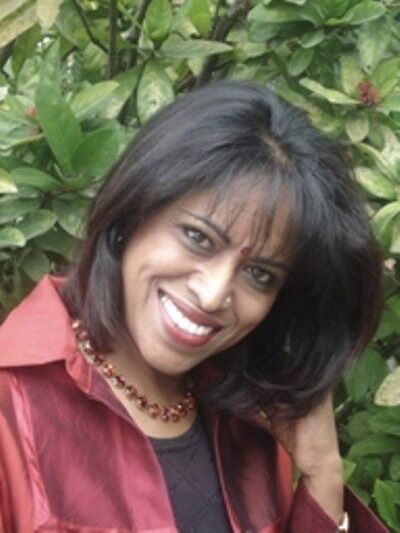
Professor Vishanthie Sewpaul (PhD), an awardee of three honorary doctoral degrees from Chile, Norway and Sweden, is a globally recognized social work and human rights scholar, international speaker and activist. She held leadership positions at institutional, national, regional and global levels, and visiting professorship positions at numerous international universities. She was nominated as a Lead SA Hero for her contribution to student development, and to community development through direct interventions, and was given institutional, national and international awards for outstanding service. In 2013, the Ministry of Science and Technology awarded her a Distinguished Women in Science Award for her “outstanding contribution to building South Africa’s scientific and research knowledge base.” She chaired the following committees on behalf of the International Association of Schools of Social Work (IASSW): Global Standards for SW Education and Training (2004); Global SW Definition (2014) and the Global SW Statement of Ethical Principles (2018). She was senior professor at the University of KwaZulu Natal (UKZN), South Africa where she remains Emeritus Professor, and is an Adjunct Professor at the University of Stavanger, Norway. She has over 100 academic publications and has recently completed her memoir titled, The Arc of Our Paths: Growing into Wholeness.
Roundtable discussion: Devils in the detail? Inter-/multidiscplinarity and nasty questions of priorities in urban sustainability research
Thursday 28.4. at 16.50–18.00 (A3)
It is increasingly becoming clear that urban sustainability can only be achieved by taking into account the interplay between environmental, social and economic dimensions of sustainability in addition to healthy aspects of human being. In response, funding institutions often explicitly demand inter- or multidisplinarity to be part of the research. The widely shared general agreement on the desirability of sustainable urban futures and the need for comprehensive approaches, however, does not necessarily entail shared conceptions of sustainability or consensual strategies towards that goal: once the funding is acquired—or even before—it often turns out that reconciling various disciplines as well as environmental, social and economic aspects of sustainability is easier said than done.
Differences may arise concerning the scope and scale of sustainable transformations of cities and in the identification of central actors, conditions and factors, but also touching upon fundamental questions of epistemology, ontology and methods. While such differences certainly provide depth and richness to the study of sustainable cities, there is also a risk that some positions become marginalized, disagreements inhibit fruitful cooperation and exchange of ideas, and inter- and multidiscplinary projects fall short of delivering on their promises. The questions arise how funding, impact measurement, but also popular and normative representations of ‘good’ and ‘relevant’ research affect whose definitions, strategies and priorities in the quest for urban sustainability become paramount but also how inter- and multidiscplinary research endeavors can be open, inclusive, critical and, ultimately, successful.
The panel digs into the all-important questions around multi- and interdisciplinarity and priorities in urban sustainability research. The panel discussion is organised by multidisciplinary STUE (Sustainable Transformation of Urban Environments) research community and profiling area in Tampere University. Session is chaired by Dr. Ilona Steiler, Postdoctoral Research Fellow in STUE.
The audience is invited to participate in discussion via commenting and presenting questions. Warmly welcome!
Panelists:
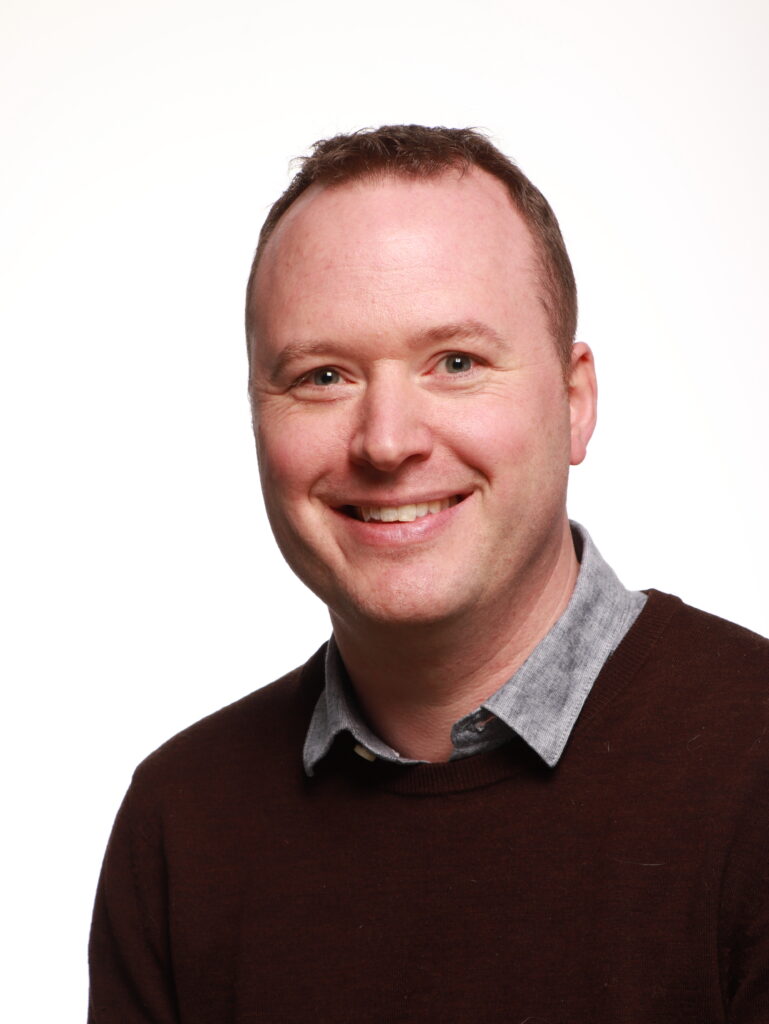
Jonathon Taylor, Associate Professor, Tampere University
Jonathon is a tenure track Associate Professor in Urban Physics in the Department of Civil Engineering at Tampere University. His research interests are in healthy and energy efficient housing and urban areas, and he is the technology stream lead for the interdisciplinary bachelors programme in Sustainable Urban Development. He has participated in a number of large interdisciplinary projects, for example collaborating with artists, architects, medical professionals, social scientists, and economists.
Outi Jolanki, Adjunct Professor, Tampere University
Outi Jolanki works currently as a research manager and researcher at the Tampere University, Faculty of Social Sciences and at the University of Jyväskylä, Department of Social Sciences and Philosophy. Her central tasks are linked to the activities of the multidisciplinary Centre of Excellence in Research on Ageing and Care (CoE AgeCare) in which she acts as the co-leader of the Tampere University group. In connection to her recent research interests of housing, emerging forms of collaborative senior housing, social wellbeing and care choices, she has wide experience of several multidisciplinary research projects and research networks, including CoE AgeCare, AISola, Co-HOPE and ASUVA.
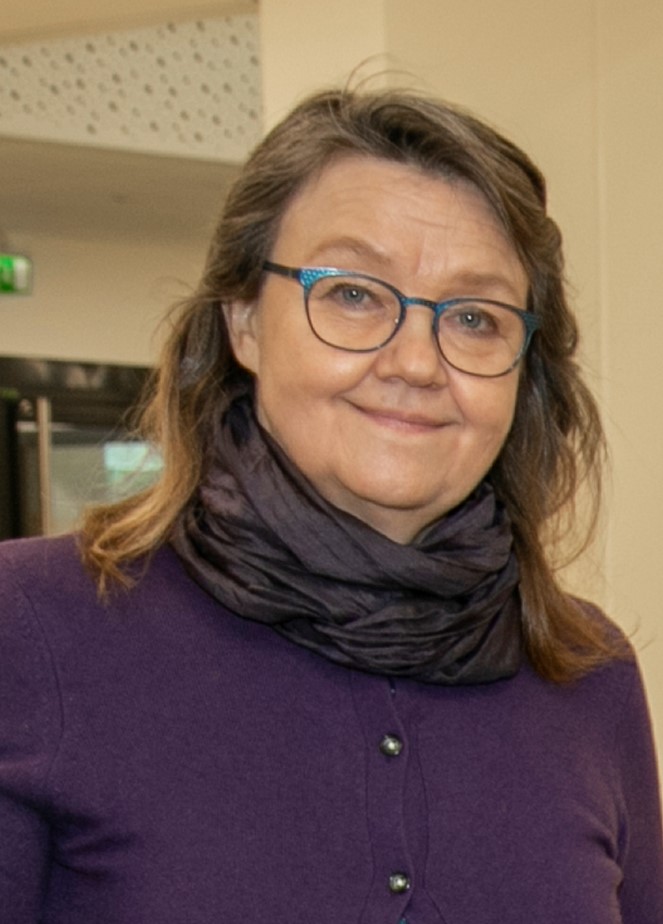
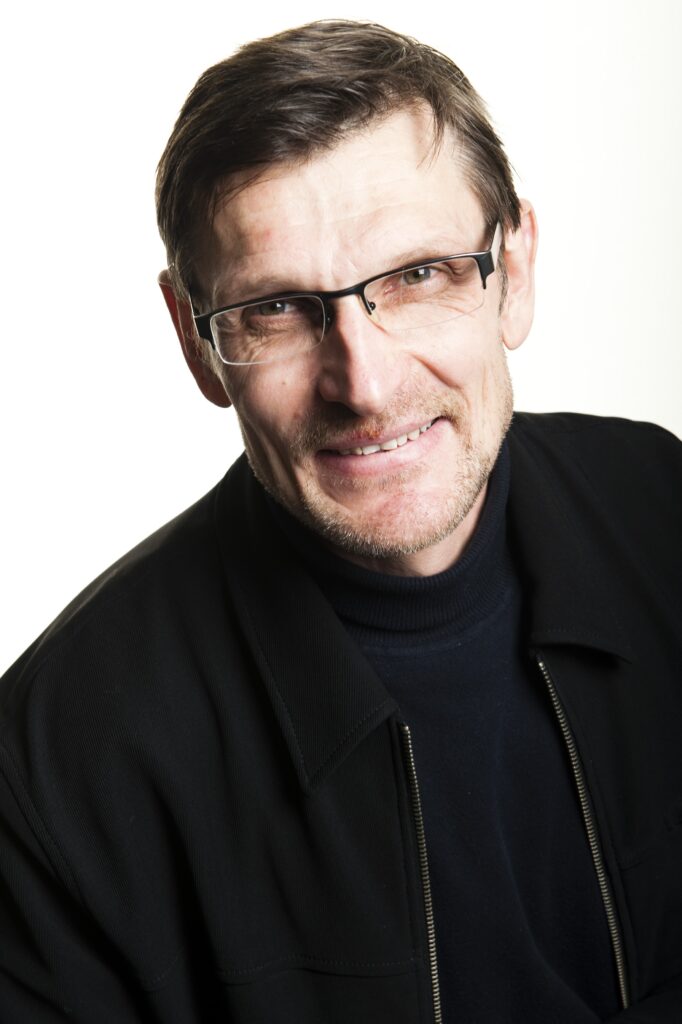
Juha Helenius, Professor, University of Helsinki
Juha Helenius is a full professor of agroecology in University of Helsinki (UH). He serves as research director and PI for sustainable food systems in Ruralia Institute of the university. He affiliates as PI to HELSUS Helsinki Institute of Sustainability Science. Recently with his research group, he has studied circularity in food systems, distributed food production and processing systems called Agroecological Symbioses (AES), and food systems based on networks of AES. His group works in close collaboration with WUR, NL.
Nina Tynkkynen, Professor, Åbo Akademi University
Nina Tynkkynen is professor in Environmental Governance and Policy at Åbo Akademi University. She leads a profiling area “The Sea” at ÅAU, which aims at finding science-based solutions to marine-related wicked problems in an interdisciplinary manner. Her research interests focus on environmental governance in multilevel contexts, politics of environmental knowledge, cultural and political aspects of sustainability transitions and transdisciplinary research methodologies. She has solid expertise in leading of interdisciplinary research projects and networks, including projects funded by the Academy of Finland, Strategic Research Council and Bonus+.
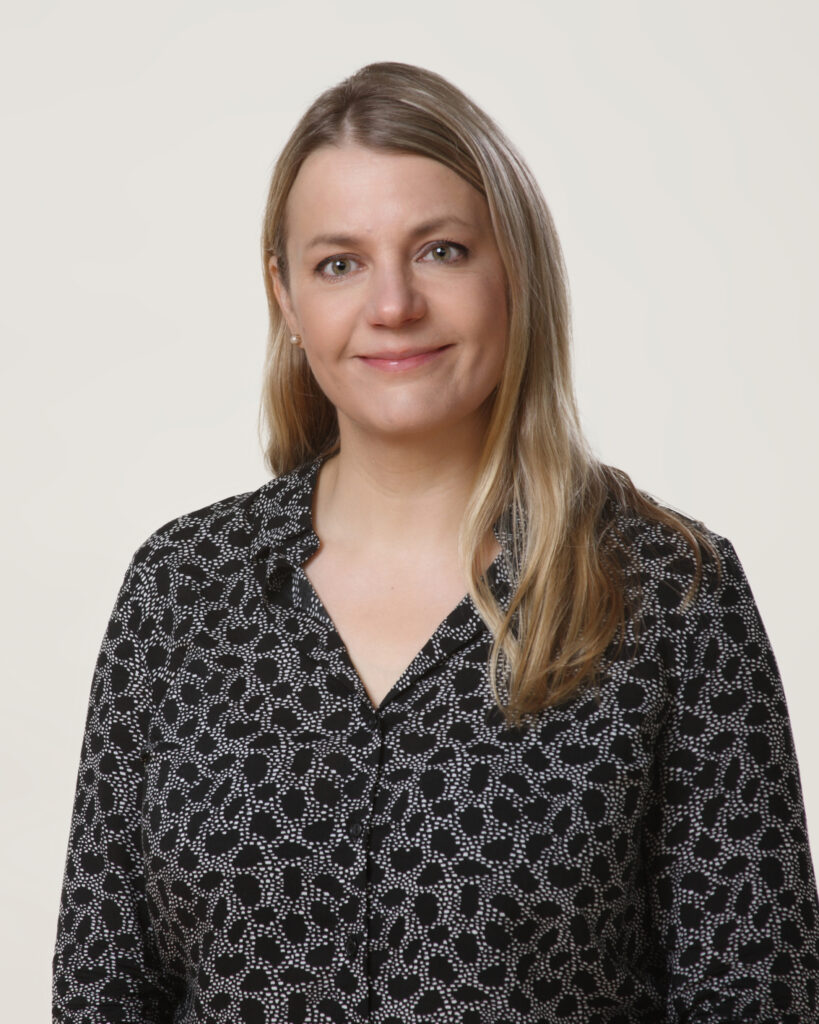
Prof. Terttu Pakarinen Memorial Roundtable Discussion on Urban Morphology and Progressive Theory
This roundtable is dedicated to the late Professor Terttu Pakarinen’s groundbreaking work at the unit of Urban Planning and Design at Tampere University of Technology, School of Architecture. Prof. Pakarinen passed away soon after her retirement, in 2012, leaving a remarkable intellectual heritage to the unit and her “academic pedigrees”. In her research and teaching, Pakarinen bridged critical European philosophical and analytical traditions to contemporary planning and design. She approached cities as dynamic, unpredictable and surprising agglomerations, whose unique qualitative features should be encouraged to enable empowering human and cultural processes. In the spirit of Jane Jacobs, Pakarinen aimed to promote diversity of urban life and quality of urban spaces. She wanted to bring urban planning back to its roots as a form of art, in the broad meaning of the word. This ethos led her to consider visual design and plan representation as important forms of communication in planning process, to promote methodological courage in architectural research and to bring the continental planning theory on par with the Anglo-American one.
Pakarinen operationalized these themes in our Unit through introducing novel theoretical stances that stressed constant change and processual nature of cities, network urbanism and urban complexity. Most important was her profound work within Italian typomorphological tradition that emphasized historical socio-spatial perspective to urban analysis and criticism. These perspectives provided methodology for progressive thought and action still nourished at our School in new work on spatial analysis, simulation, Space Syntax, network city, advanced morphological methods such as metamorphology and beyond. To Pakarinen, these theories and applications presented opportunities to criticize the rational comprehensive thinking, still prevalent in planning praxis in the early 2000s, and to liberate human mind into more creative activities in the fields of art and culture. Philosophically, she contemplated these aspects in her latest work on urban metaphors.
Today, ten years later, Pakarinen’s thinking has taken root in a variety of research projects. Her scientific and ethical perspective is topical regarding sustainability: current pandemic, climate change, social polarization and erosion of democracy all underline urban systems’ unpredictable dynamics and our limited capacities to control them. Moreover, ongoing digitalization and virtualization posit an unprecedented challenge to cities’ spatial logic, so essential to Prof. Pakarinen. With her words: We occasionally need to reconsider our theorical stance – and eventually any theory makes itself unnecessary.
In this roundtable discussion we delve into Professor Pakarinen’s intellectual legacy, reflecting her groundbreaking ideas to contemporary cities and their emerging challenges ranging from virtual cities and ubiquitous digitalization of urban environment and the toolkit of urban planner/designer to philosophical and political stances necessary to understand and guide technological mediated cities and other radical, systemic changes of society and spatial practices.
Panelists:
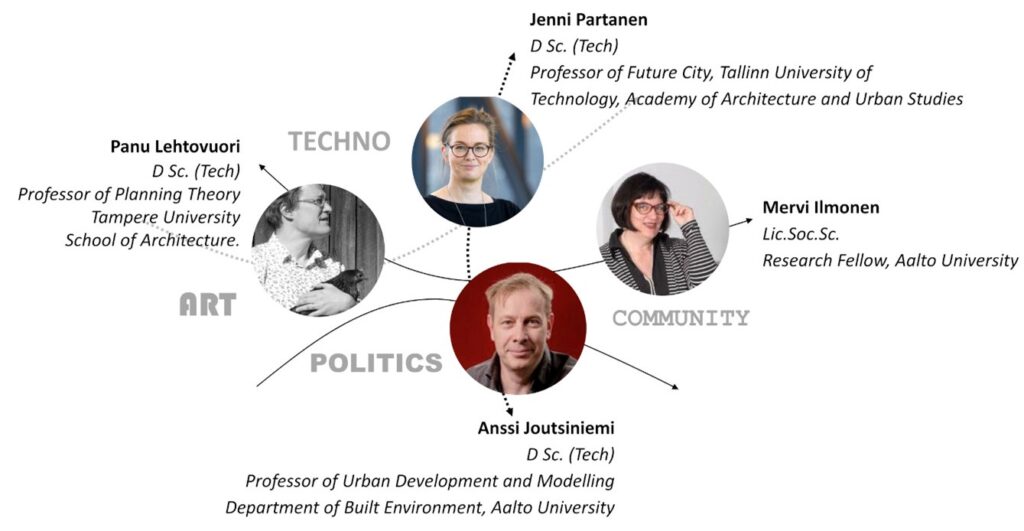
Mervi Ilmonen
Lic.Soc.Sc., Research Fellow, Aalto University
Anssi Joutsiniemi
D Sc. (Tech), Professor of Urban Development and Modelling, Department of Built Environment, Aalto University
Panu Lehtovuori
D Sc. (Tech), Professor of Planning Theory, Tampere University, School of Architecture.
Jenni Partanen
D Sc. (Tech), Professor of Future City, Tallinn University of Technology, Academy of Architecture and Urban Studies